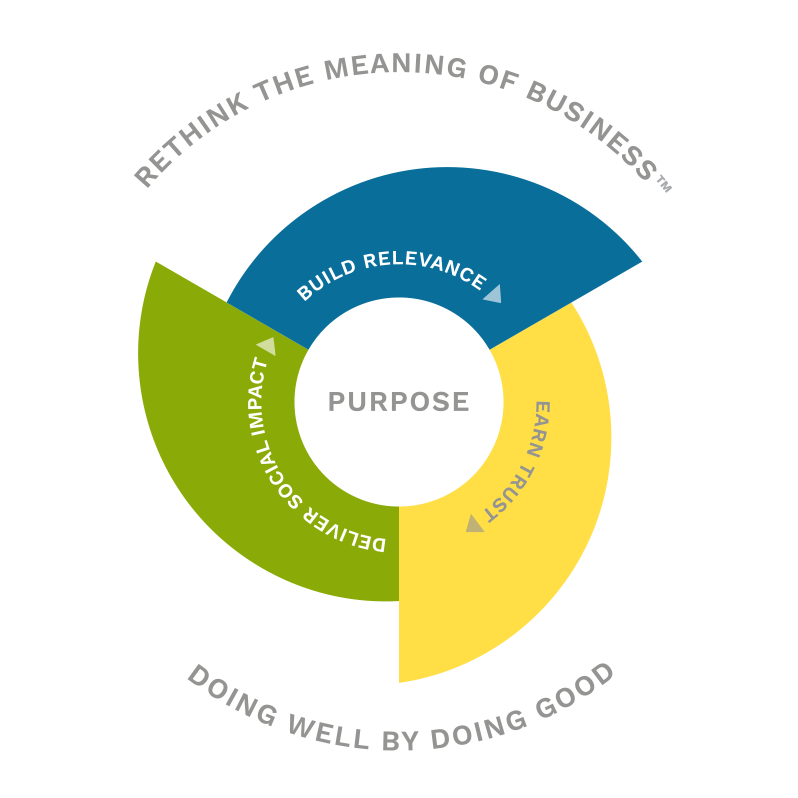As business, technology and society evolve at lightning speed, there are insights to be learned when we take a moment to stop and look inward. Even leading corporations are searching to find their north star.
Is our business truly living its values? Is our purpose relevant to those we serve? Are we trusted by our most important constituents? And, do they feel valued? Is our organization sharing its resources, talents and compassion to positively impact the world we share? Increasingly, companies are struggling to answer these fundamental questions. And, simultaneously, stakeholders expect companies to stand for something more…to LEAD.
There’s a difference between being a thought leader and being a Leader with a capital L. Authentic leadership is ingrained in a company’s DNA, purpose, actions and responses in good times and bad. It’s easy to show-up at an international summit, forum or “talk” and espouse your company’s forward-thinking platforms, ideas and provocative “what ifs?” It’s the rare company and CEO who lives a company’s core purpose from the inside out. But, reputation leadership is built on this promise – that a company and its people will do the right thing, take a stand, and lead with common sense and compassion - even when some suggest that taking a safer road is the best choice.
Let’s shift our mindset about how we “manage” our corporate reputation and instead, rethink the very meaning of our business. What is it we are called to do as Bankers, Lawyers, Investors, Engineers, Product Developers and Designers on behalf of our businesses? The world’s most respected brands are rooted in purpose and meaning. It is the responsibility of employees from the front line to the c-suite to bring this purpose to life. This is demonstrated when a company activates a fully integrated customer experience, governance, communications and social impact initiatives into a cohesive strategy. Put simply, companies that matter are managing reputation by integrating both their business and social purpose.
We know that some actions have greater impact than others that’s why we’ve developed an innovative approach to address complex business and societal issues. Our model is designed to build long-lasting relationships with stakeholders that enhance reputation, create avid supporters, grow profit and drive real change in local communities.
STEP ONE: BUILD RELEVANCE
It all starts with the right research to identify what will make a difference to stakeholders, business performance and reputation. Knowing what to measure is as important as how it is measured. Using tools that focus on establishing the current state of understanding, value and expectation from across ALL stakeholders is critical. Survey questions with an emphasis on corporate behaviors, products and services, social impact and emotional attachment to a company can be added to existing marketing research, employee surveys and other established research tools.
For a more comprehensive approach, new research, complemented by a variety of qualitative and quantitative techniques, can establish a more actionable baseline and identify performance, value and reputation drivers. Detailed insights and a map of the current state can help corporations articulate rigorous and precise goals.
STEP TWO: EARN TRUST
Public trust has been in decline in many areas of society, but we know that trust is earned when actions and words are aligned, communicated and delivered. Trust can be restored or earned more rapidly when it is also built around causes that make a difference to people personally and are connected to an organization’s purpose.
Earning trust is not an easy task. It requires putting in place the correct structures, policies, governance, engagement strategies and communications to enable ideas to be activated in ways that are relevant, build relationships and create opportunities to earn confidence.
A relevant brand and social value proposition are a good place to start. These guide the implementation of a reputation strategy that connects: communications, stakeholder engagement, brand positioning, public policy, organizational structure and governance. These elements combine to build trust while bringing all stakeholders along the path from limited awareness to passionate advocacy.
STEP THREE: DELIVER SOCIAL IMPACT
Leading corporations know that investing in society pays off, not only for the community but for their business. Stakeholders from customers to employees are demanding that corporations become involved in solving society’s most serious problems.
In fact, in their 2016 Earned Brand study, Edelman reported that over 50% of consumers are “belief-driven buyers”. The number is 60% for Millennials. And, Nielsen reports that 73 percent of Millennials prefer to work with socially responsible companies.
Harnessing the power of companies to create positive, measured and profitable social change requires aligning social needs with organizational power. Corporations must bring together the skills, products, resources, expertise and services to support a cause, meet an unmet need, increase levels of participation and engagement and enhance reputation. By selecting the “right” cause and not-for-profit partners, corporations can establish activation processes to ensure delivery is consistent and sustained, and that no one forgets the longer-term impact.
Reputation is indeed rooted in purpose and action. To establish reputation leadership for your company, it’s imperative that your brand and your people are relevant, trusted and guided by a greater mandate – to serve both your stakeholders and society.


